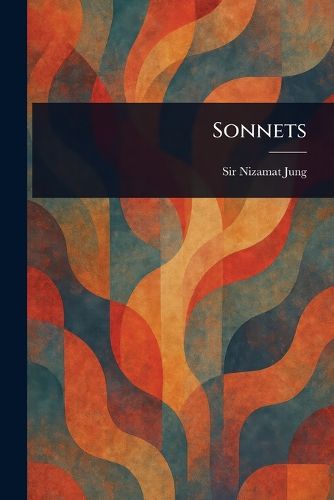Readings Newsletter
Become a Readings Member to make your shopping experience even easier.
Sign in or sign up for free!
You’re not far away from qualifying for FREE standard shipping within Australia
You’ve qualified for FREE standard shipping within Australia
The cart is loading…






This title is printed to order. This book may have been self-published. If so, we cannot guarantee the quality of the content. In the main most books will have gone through the editing process however some may not. We therefore suggest that you be aware of this before ordering this book. If in doubt check either the author or publisher’s details as we are unable to accept any returns unless they are faulty. Please contact us if you have any questions.
Discover the exquisite "Sonnets by The Nawab Nizamat Jung Bahadur," a captivating collection of 19th-century poetry from the Asian subcontinent. Penned by The Nawab Nizamat Jung Bahadur, also known as Nizam-ud-din-Ahmad, these sonnets offer a rare glimpse into the world of Indian poetry and the artistic expression of a prominent figure of his time. This volume presents a carefully prepared republication of his work, showcasing the beauty and depth of his poetic vision.
Immerse yourself in the rich tapestry of his verses, reflecting on themes of love, life, and the cultural landscape of his era. This collection serves as a testament to the enduring power of poetry and provides a valuable contribution to the understanding of Asian literary traditions. Perfect for enthusiasts of poetry, Asian literature, and historical biography, "Sonnets by The Nawab Nizamat Jung Bahadur" promises an enriching and thought-provoking reading experience.
This work has been selected by scholars as being culturally important, and is part of the knowledge base of civilization as we know it.
This work is in the public domain in the United States of America, and possibly other nations. Within the United States, you may freely copy and distribute this work, as no entity (individual or corporate) has a copyright on the body of the work.
Scholars believe, and we concur, that this work is important enough to be preserved, reproduced, and made generally available to the public. We appreciate your support of the preservation process, and thank you for being an important part of keeping this knowledge alive and relevant.
$9.00 standard shipping within Australia
FREE standard shipping within Australia for orders over $100.00
Express & International shipping calculated at checkout
Stock availability can be subject to change without notice. We recommend calling the shop or contacting our online team to check availability of low stock items. Please see our Shopping Online page for more details.
This title is printed to order. This book may have been self-published. If so, we cannot guarantee the quality of the content. In the main most books will have gone through the editing process however some may not. We therefore suggest that you be aware of this before ordering this book. If in doubt check either the author or publisher’s details as we are unable to accept any returns unless they are faulty. Please contact us if you have any questions.
Discover the exquisite "Sonnets by The Nawab Nizamat Jung Bahadur," a captivating collection of 19th-century poetry from the Asian subcontinent. Penned by The Nawab Nizamat Jung Bahadur, also known as Nizam-ud-din-Ahmad, these sonnets offer a rare glimpse into the world of Indian poetry and the artistic expression of a prominent figure of his time. This volume presents a carefully prepared republication of his work, showcasing the beauty and depth of his poetic vision.
Immerse yourself in the rich tapestry of his verses, reflecting on themes of love, life, and the cultural landscape of his era. This collection serves as a testament to the enduring power of poetry and provides a valuable contribution to the understanding of Asian literary traditions. Perfect for enthusiasts of poetry, Asian literature, and historical biography, "Sonnets by The Nawab Nizamat Jung Bahadur" promises an enriching and thought-provoking reading experience.
This work has been selected by scholars as being culturally important, and is part of the knowledge base of civilization as we know it.
This work is in the public domain in the United States of America, and possibly other nations. Within the United States, you may freely copy and distribute this work, as no entity (individual or corporate) has a copyright on the body of the work.
Scholars believe, and we concur, that this work is important enough to be preserved, reproduced, and made generally available to the public. We appreciate your support of the preservation process, and thank you for being an important part of keeping this knowledge alive and relevant.